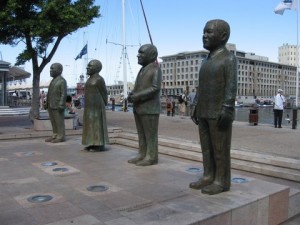Viewpoint – Censorship: The Long Walk to Freedom into a Cul-de-sac? The South African ‘secrecy bill’
An information bill that is being debated in the next few months in South Africa could put democracy to the most extreme test.
Nelson Mandela came out of prison in the 90s at the end of apartheid, which was a state led separation and oppression of non-whites, and assumed power in 1994 with the ruling African National Congress (ANC) party. For 27 years he had carried a vision that all citizens would be equal under the law and that a free press would finally be allowed to flourish without hindrance from the state.
Yet as the controversial Protection of State Information Bill (POSIB), known as the “secrecy bill”, is waiting to become official this vision might become slightly if not totally distorted.
POSIB was created in 2010, to replace the 1982 Protection of Information Act 84, a piece of apartheid legislation that was still a part of the South African constitution, dealing with pre-publication censorship issues. POSIB is causing such controversy in media organisations and civil society that an ad hoc committee was formed to address the complaints that the bill was draconian in nature. One of the biggest issues of the replacement bill is the state’s definition of “national security”, which clashes with media organizations’ views of the public’s right to knowledge and freedom of access to information in a civil society. Under the regulations of the bill publishing what is considered to be a state secret could land those responsible in jail for up to 25 years.
Synchronicity Magazine spoke to the London President of the National Union of Journalists (NUJ), Donnacha De Long, a 36 year- old Irishman who has been in the role since last year, who said: “Any kind of measure like this for journalism is chilling. Information that the state holds about what it does should be made available to all members of a democratic society. The government’s moves to make everything secret, as the South African government appears to be trying to do, points towards a very authoritarian streak within them.”
Some amendments have been made to the bill, yet many areas still cause concern as to how they might infringe upon press freedom and public access to information. A majority voted the new amended bill on 22 November 2011 in the National Assembly. Yet although the bill has been passed, it could only become official when the National Council of Provinces (NCOP) debates it next month.The biggest problem with the POSIB is that large number of South Africans are unaware of it and what it is all about. There has been a lot of resistance to the bill though with public protests and a campaign called Right 2 Know which gather support from 400 organisations opposing it.
It has been a busy time for the South African government, because in the shadow of this bill another event has been happening concerning press freedom and the public’s right to know. Mail & Guardian (M&G) a newspaper that in the past fought against apartheid censorship has been battling against another fighter of apartheid Mac Maharaj. Maharaj is The presidential spokesperson for the ANC and has been accused of being involved in a clandestine arms deal with a French company, that was worth 2.3 million South African Rands (£167.000), between 1997 and 1999.
Maharaj threatened M&G under the National Prosecuting Authority Act (NPA) that if the newspaper’s journalists Brümmer and Sole, who wanted to publish the story based on the accusations, had done so they would have gone to prison for 15 years. This was because the NPA had done an investigation on Maharaj in 2003 , M&G obtained this information, yet according to the law it is confidential. This of course meant that the paper had to tread carefully. In protest, M&G employed a technique that they learnt back in 1985, when the apartheid regime censored information the paper had, leading to parts or even whole pages being printed in black. In this recent case, only the sections containing allegations and information on the Maharaj case were blackened out, but this must have been quite a painfully reminiscent sight to see in the new South Africa.
Although issues concerning the NPA and the POSIB are separate areas of the law both of them carry exceptionally hefty sentences a combined 40 years between the two. If ever there was a deterrent for a journalist not to investigate government goings on this would be it. Yet to point a finger, in a sensational tabloid style, to compare these acts and bills to apartheid measures of dealing with censorship is irresponsible and it is to forget the freedoms in this new democracy that never could have existed before under the old regime. Be that as it may, as De Long said, this seems to point towards a very authoritarian streak within the government.
Synchronicity Magazine spoke to the Head of the ANC abroad, Xolani Xala who moved to Europe at the age of 11 and started organising the congress in London in 2009. Regarding the POSIB, Xala said: “The conflict of interest is between politics and media. They should not be on the same level, because when a politician talks about the bill, and a journalist does, there is a conflict of interest. It is like a political party driving an agenda to a court and then they [journalists] claim that this is a public agenda, but it’s not. It’s a political agenda because it has been driven through by politics.”
Xala remained firmly fixed on the party line and was unable, or perhaps not willing, to see the point that journalism is there to become that conflict of interest in a democratic society. Especially If done with integrity it is a tool for the masses, watchdogs that keep politicians on their toes and make sure that the public interest is adhered to.
South Africans wait in anticipation while the bill is being debated. Its outcome could take the country in a new direction and it would be sad if South Africa’s long journey into its new age of democratic enlightenment was to lead to a dead end that blocked out its place in the sun.

























